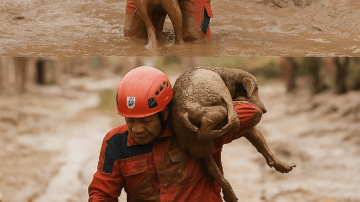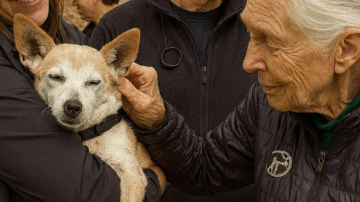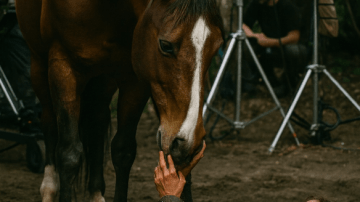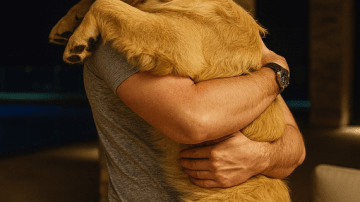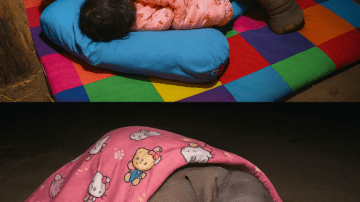What had he done wrong? Why was he being treated like this? Those were the first questions that ran through our minds the day we found him.

Found by the Trash
The call came from a group of residents. They had seen a tiny, broken puppy lying beside a pile of trash. According to the witness, he had been thrown there just the day before. Strangers with kind hearts placed him in a cardboard box, shielding him from the cold, but his body was already so frail that his breathing was shallow, his chest barely rising.
When we arrived, we could hardly believe our eyes. His body was battered, his movements weak and jerky. His eyes—one of them badly injured, almost blasted out—told a story of pain that words could not. His skull had fractures, his pelvis had shattered into pieces. He was less than two years old, a baby in every sense, yet he had already endured what most could not survive.
He needed to be rushed to the hospital immediately.
A Battle Against Death
The doctor’s voice was grave: his condition was critical. “Little guy,” I whispered, “you must hold on.”
It had been freezing cold the night before, yet somehow he had survived. Now, he whimpered in pain, his body twisting with seizures. Watching him cry out was like having needles pierce our hearts.
That night, he slipped into a coma. His tiny body twitched violently, and all we could do was pray. “Just survive these first few days,” we pleaded. “If you can make it past this, there may be hope.”
Naming Hope
By the third day, he had been in a coma for almost fifty hours. We crafted a small necklace, a charm of protection, and placed it gently around his neck. Then we gave him a name: Shi Er—Twelve. A name to mark his new beginning.
And then, against all odds, he ate. Just a little at first, but enough to send tears streaming down our cheeks. Eating meant life. Eating meant he still had the strength to fight.

By the fourth day, sitting beside his cage had become a habit. Even though he was still unconscious, we could not leave him alone. Seventy-two hours had passed, yet he clung stubbornly to life. Slowly, ever so slowly, his condition began to stabilize.
When he ate three tubes of food in a row, our hope ignited. “If you can eat, you can live,” we told him.
Small Miracles
On the sixth day, he turned his body by himself. When I touched him, he responded faintly. He even blinked. “Twelve, don’t cry. We’re all here with you,” I whispered.
By day seven, we had been through so much together. Every day, he received nutritional supplements. The doctor cautiously told us: “He might survive a few more days.” We clung to those words.
On the eighth day, there was light in his eyes. The old saying came to mind: after great disaster, blessings will follow. We believed it. “Twelve, you will know happiness one day,” we promised. He ate a whole jar of food, then meat. Hope was becoming real.

A Smile Through Darkness
On the eleventh day, something extraordinary happened. Though he could not hear or see clearly, he smiled. Yes—he smiled when I held him in my arms. He leaned against me, content, safe, comforted.
“Sleep quietly, Twelve,” I told him. “Tomorrow will be better.”
Two days later, we took him for a CT scan. On the journey, he kept raising his head, trying to feel the sunlight on his broken body. It was heartbreaking and inspiring at the same time.
The results were harsh: his skull remained fractured. By all medical logic, he should not have survived this long. And yet, there he was, breathing, eating, blinking, fighting.
We chose not to give up. He had already proven that miracles were possible.
Fighting Together
By day seventeen, he lay sleeping peacefully, as though exhausted from the long battle. That day brought new hope: his pupils reacted to light. Perhaps, just perhaps, he might see again.
On day twenty-seven, the news grew better. He no longer needed sedatives. He could eat on his own. Each tiny improvement was celebrated like a victory.
A month after being hospitalized, the unthinkable had happened: Twelve was alive.
More Than Survival

Looking at him then, I realized he was not just a broken puppy we had rescued. He was a symbol of resilience. He was proof that love, persistence, and hope can rebuild what cruelty tries to destroy.
“Twelve,” I whispered, stroking his head, “you are not an abandoned child. You are a miracle captured by love. Your future is ours to walk together.”

